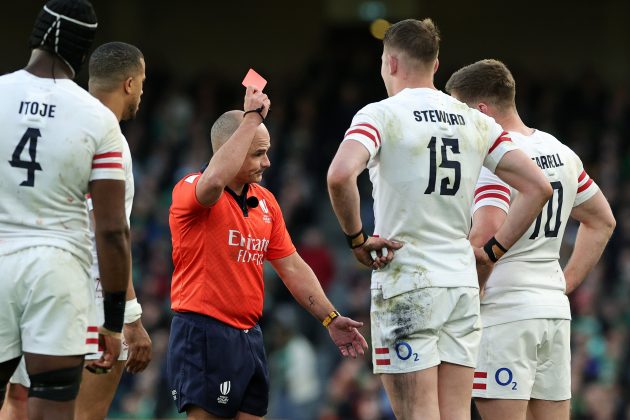England full-back sent off for direct contact to the head
England full-back Freddie Steward was shown a red card by referee Jaco Peyper after an awkward collision with Ireland’s Hugo Keenan in the final Six Nations clash of the championship.
Ireland winger Mack Hansen knocked the ball on attempting to offload out of the tackle and both Steward and his Irish counterpart Keenan attacked the loose ball with the Leinster man beating the Leicester Tigers star to gather it.
Steward appeared to brace himself and turned his body to the side with the replays showing that his elbow made contact with the head of Keenan.
England's afternoon gets a lot tougher
Do you think Freddie Steward deserved to see red for this?
#GuinnessSixNations | #ITVRugby pic.twitter.com/yql6jKprJW
— ITV Rugby (@ITVRugby) March 18, 2023
After consulting with his TMO, South African official Peyper suggested there was no mitigation and a high level of force, so chose to give Steward his marching orders right on the cusp of half-time.
For the second time in two years, after Charlie Ewels’s early bath at Twickenham in 2022, an England player saw red against Ireland.
Ireland went into the break 10-6 to the good, despite a much improved showing from England – who were hammered 53-10 by France last week – with Johnny Sexton breaking the all-time Six Nations points record courtesy of an early penalty.
"We're talking milliseconds here…"@BrianoDriscoll8 on the red card decision just before half time.#GuinnessSixNations | #ITVRugby pic.twitter.com/m6iW7ipZJJ
— ITV Rugby (@ITVRugby) March 18, 2023
Opinion: Freddie Steward red card the wrong call
By Josh Graham
Just when you thought we were past controversial red cards with everyone seemingly on the same page when it came to head contact…
First things first, trial by slow-motion replay is going too far at the highest level when split-seconds make all the difference. You barely batted an eyelid when Steward and Keenan appeared to collide innocuously at real speed as play broke down.
With the ball loose, both players are clearly coming towards it and Steward has very little time to react when he realises Keenan has edged the race to it. It’s certainly not a tackle situation and it seems overly harsh for it to be judged as so.
That’s not to undermine the injury suffered by Keenan and it was a great shame to see him fail his HIA. Of course, the game has a duty to protect players. But a bit of common sense and a neutral eye would surely declare this as a rugby incident rather than an instance of foul play.
And the fact that Peyper could not find any mitigation at all seems hard hard to believe given Steward did not have a long time to line up his man like a usual tackle as his opponent claimed possession milliseconds before they collided. Not only that, but Keenan’s height, having stooped to collect the ball, was surely was a factor given how often we talk about a change in height.
Red cards are about deterrent and changing the way players tackle but this was a different kettle of fish.
Peyper himself summed up the pickle rugby union has got itself into, when unpicking his decision. He said: “In today’s current climate you are upright and it’s reckless.”
The harsher sanctioning of high tackles has been both necessary and encouraging to see with player welfare at the forefront but we shouldn’t lose sight of the fact that at its heart rugby is a contact sport and there will be incidents that don’t always fit into the decision-making mould.
On this occasion, the punishment did not fit the crime.
Download the digital edition of Rugby World straight to your tablet or subscribe to the print edition to get the magazine delivered to your door.
Follow Rugby World on Facebook, Instagram and Twitter.







